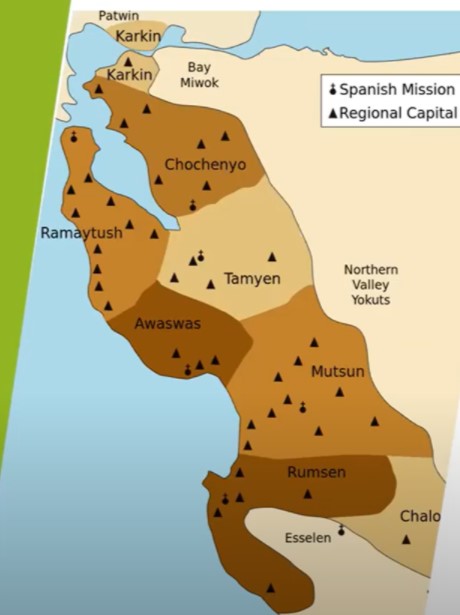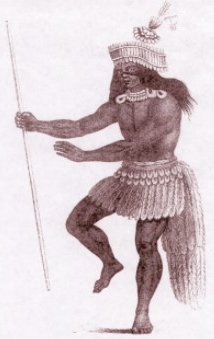Ohlone Land Acknowledgement

The Ohlone are located on the Northern California Coast. Ohlone was an umbrella term given to the collective of various tribes, bands, and territories. Chabot College sits on land recognized as Ohlone Muwekma, the Chechenyo speaking People. This land was and continues to be of great importance to the Muwekma Ohlone Tribe and other familial descendants of the Verona Band.
What is Ohlone Land Acknowledgement?
“Land acknowledgements are an honest and historically accurate way to recognize the traditional First Nations.”
“One goal, regardless of format: They commemorate Indigenous Peoples’ principal kinship to the land—and the fact that we have not and cannot be erased from her, our collective first mother. They’re a starting place to a change in how the land is seen and talked about.” (Local Love)
How to use the Ohlone Land Acknowledgement?
We encourage Chabot College groups and individuals to acknowledge Ohlone land at the beginning of campus events, classes, and/or meetings.
This can be communicated in various ways. It can be:
- Recited out loud or in thought;
- A brief verbal acknowledgement during the welcome remarks;
- Included in the event program, brochures, websites, syllabi, Canvas sites, and added below email signatures
- Performed by anyone.

Versions
Mákkin Mak Muwékma Wolwóolum, ’Akkoyt Mak-Warep, Manne Mak Hiswi!
We Are Muwekma Ohlone, Welcome To Our Ancestral Homeland!
Muwekma Ohlone Tribal Land Acknowledgment For Chabot College located in Hayward, CA
Jalquin/Yrgin Ancestral Muwekma Ohlone Territory
Horše túuxi! (Hor-sheh troo-hee). We would like to recognize that while we gather at Chabot College located in Hayward, CA, we are gathered within the ethno-historic tribal territory of the intermarried Jalquin (hal-keen) / Yrgin (eer-gen) Chochenyo-Ohlone-speaking tribal groups, who were the direct ancestors of some of the lineages enrolled in the Muwekma Ohlone Tribe of the San Francisco Bay Area, and whom were missionized into Missions San Francisco, Santa Clara and San Jose.
The present-day Muwekma Ohlone Tribe, with an enrolled Bureau of Indian Affairs documented membership of over 600 members, is comprised of all of the known surviving Indian lineages aboriginal to the San Francisco Bay region who trace their Tribe’s ancestry through the Missions San Jose, Santa Clara, and San Francisco, during the advent of the Hispano-European empire into Alta California beginning in AD 1769. The Muwekma Families are the successors and living members of the sovereign, historic, previously Federally Recognized Verona Band of Alameda County now formally recognized as the Muwekma Ohlone Tribe of San Francisco Bay Area. Muwekma means La Gente – The People in their traditional Chochenyo-Ohlone language.
The land on which Chabot College in Hayward is established, was and continues to be of great importance and significance for the Muwekma Ohlone Tribal People. The Chabot College Campus extends to surrounding areas that held several Túupentaks (too-pen-tahks) (aka Temescals), traditional semi-subterranean spiritual roundhouses. Túupentaks were places of celebrations, healing, rituals, dances, intertribal feasts, and religious ceremonies. The Chabot College Campus also extends to nearby ancestral heritage “shellmound sites,” such as those located at Máyyan Šáatošikma ~ Coyote Hills, and along the Bayshore surrounding the greater Berkeley and Emeryville areas, which served as the ancestral Muwekma Ohlone Tribe’s territorial monuments and traditional cemetery sites for high lineage families, craft specialists, and fallen warriors.
The region surrounding the City of Hayward, and Chabot College, is where many of the Tribe’s ancestral heritage cemetery and village sites are located especially adjacent to San Lorenzo, San Leandro, Castro Valley, Sulphur, and Ward Creeks, and other freshwater drainages, where many have been destroyed through unbridled development. These localities are viewed as special and sacred places, and we respectfully acknowledge that they had been previously settled and controlled by ancestral Muwekma Tribal groups for many thousands of years. Today, the Muwekma Ohlone Tribal leadership and members work as stewards for many of their,10,000-year-old ancestral heritage village and cemetery sites. Such as the location of the nearby Fairmont County Hospital, this was the place of one of the Tribe’s major rancherias called “The Springs,” during the middle-late 1800s where their families planted various crops and raised cattle.
As previously mentioned, the City of Hayward is established within the Muwekma ancestral Jalquin/Yrgin Ohlone Tribal ethnohistoric territory, which based upon the 18 unratified federal treaties of 1851-1852, includes the unceded ancestral lands of the Muwekma Ohlone Tribe of the San Francisco Bay Area. Missions San Jose, Santa Clara, and San Francisco records document that many of the enrolled Muwekma lineages are directly descended from the Jalquin/Yrgin Chochenyo Ohlone-speaking tribal groups, as well as from neighboring Ohlone tribes.
It is important that we not only recognize the history of the land of the Jalquin/Yrgin on which we gather to participate, learn, and honor, but also recognize that the First People of this region – the Muwekma Ohlone People, are alive and thriving members of the Hayward and broader Bay Area communities today.
Even though their Tribe was denied a land base due to the gross negligence of derelict BIA officials, after the Tribe was first federally recognized in 1906, it is because of the tenacity and strength of their ancestors and elders, that their People have been able to maintain their identity and traditions, and keep their culture and language alive. Furthermore, the Muwekma Ohlone families have never left their indigenous ancestral lands. Today they repair the sustained damages of over 251 years of colonization. They are focused on keeping their traditional culture strong, while they work for a bright and favorable future for their children, as they follow in the footsteps of their ancestors.
We respectfully request, that the good citizens of the City of Hayward and surrounding Towns strive to be faithful stewards on behalf of the Muwekma Ohlone Tribe by maintaining the bay, freshwater ways, native plants, animal habitats, and the air we all breath. Furthermore, we request that Chabot College, the City of Hayward, and surrounding Towns within Alameda County honor the military service of the Muwekma men and women who have honorably served overseas during World War I, World War II, Korea, Vietnam, Desert Storm, Iraq and who are still serving in the United States Armed Forces today; and honor the tribal veterans and service members from California, North and South America who have served this country with dignity and honor.
In closing, it is of great importance to acknowledge the significance of this Holše Warep (hol-sheh wah-rehp) ~ Beautiful Land to the indigenous Muwekma Ohlone People of this region. We ask everyone who attends or visits Chabot College in Hayward, to be respectful of these aboriginal lands and natural habitats within their traditional homeland, and consistent with their principles of community and diversity, strive to be good stewards on behalf of the Muwekma Ohlone Tribe, on whose land you are their guests
Makiš horše mak-hinnan. ’Útasput makkam. Mak ’Iwe.
(Mahk-keesh hor-sheh mahk-hee-non. Oo-trahs-poot mahk-kahm. Mahk ee-weh.)
Thank you. And on behalf of the Muwekma Ohlone Tribe, we hope you celebrate, honor, and stand in solidarity with all Indigenous People with their struggles to reverse the adverse colonial legacies affecting all people of color in Hayward, the greater Bay Area, California, the United States, and the Americas, as we gather and reflect on the sacred lands of the Muwekma Ohlone Tribe. Aho!
Mákkin Mak Muwékma Wolwóolum, ’Akkoyt Mak-Warep, Manne Mak Hiswi!
We Are Muwekma Ohlone, Welcome To Our Ancestral Homeland!
Muwekma Ohlone Tribal Land Acknowledgment For Chabot College located in Hayward, CA
Jalquin/Yrgin Ancestral Muwekma OhloneTerritory
Short Version
Horše túuxi! (Hor-sheh troo-hee)
Chabot College recognizes that it is located on the ethnohistoric territory of the ancestral and traditional land of the Jalquin (hal-keen) / Yrgin (eer-gen) Chochenyo-Ohlone-speaking People, and the successors of the historic sovereign Verona Band of Alameda County, presently identified as the Muwekma Ohlone Tribe of the San Francisco Bay Area. This land was and continues to be of great importance to the Muwekma Ohlone Tribe and other familial descendants of the Verona Band.
We recognize that every member of the greater Hayward community has, and continues to benefit from, the use and occupation of this land, since the institution’s founding in 1961. Consistent with our values of community, inclusion, and diversity, we have a responsibility to acknowledge and make known through various enterprises Chabot College’s relationship to Native peoples. As members of the Hayward community, it is vitally important that we not only recognize the history of the land on which we live, work, and learn, but also, we recognize that the Muwekma Ohlone People are alive and flourishing members of the Hayward and broader Bay Area communities today. Aho!
We would like to begin this [program] by recognizing that we are gathered on the ethnohistoric tribal territory of Jalquin/Yrgin Chechenyo-speaking Ohlone tribal group, direct ancestors of the Muwekma Ohlone Tribe, who were missionized into Missions Dolores, Santa Clara, and San Jose.
The land on which Chabot College was established was and continues to be of significance to the Muwekma Ohlone Tribe. Surrounding areas held a tuppentak, a traditional Roundhouse which was located at the historic ‘The Springs’ Rancheria, which was a place of celebration and religious ceremony, as well as nearby ancestral heritage “shellmounds,” which serve as traditional cemetery sites and territorial markers.
We recognize the importance of this land to the indigenous Ohlone People of this region and strive to be good stewards on behalf of the Muwekma Ohlone tribe whose lands we occupy.
Chabot College respectfully acknowledges the original peoples of the lands on which this campus is built. For thousands of years and hundreds of generations the Chochenyo people actively stewarded these lands to ensure they provided for all living things. This land on which Chabot was established was and continues to be of significance to the Muwekma Ohlone tribe. Today we acknowledge the impact colonization had on the Chechenyo/Muwekma Nation and recognize our responsibility to help them heal from this history and secure a sustainable future.
En Español
Chabot College reconoce respetuosamente a los pueblos originarios de las tierras en las que se construye este campus. Durante miles de años y cientos de generaciones, el pueblo Chochenyo administró activamente estas tierras para garantizar que sustentaran a todos los seres vivos. Esta tierra en la que se estableció Chabot fue y sigue siendo importante para la tribu Muwekma Ohlone. Hoy reconocemos el impacto que tuvo la colonización en la nación Chechenyo/Muwekma y reconocemos nuestra responsabilidad de ayudarlos a recuperarse de esta historia y asegurar un futuro sostenible
We acknowledge the land and the peoples to whom this land belongs. This is Ohlone land and they are still here. We stand in solidarity with all indigenous people and their right to self-determination and justice. We commit to working toward the healing of the generational trauma, theft, and dispossession native peoples’ have faced and continue to face.
